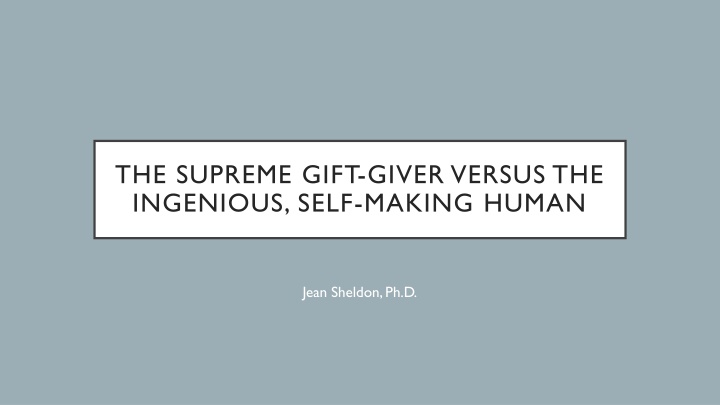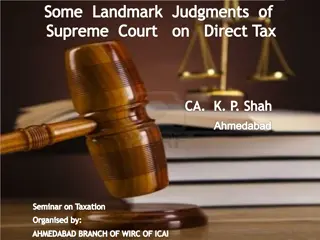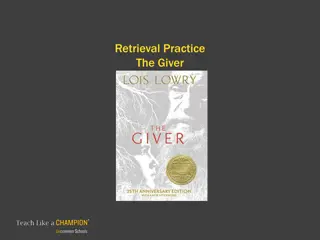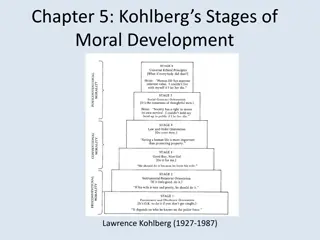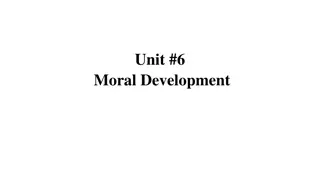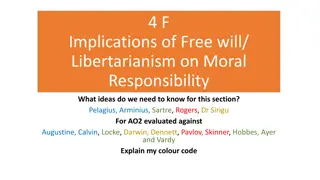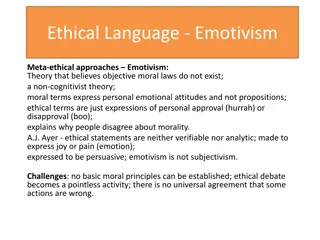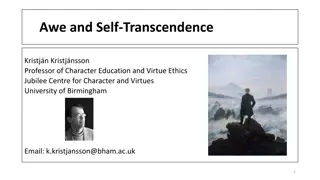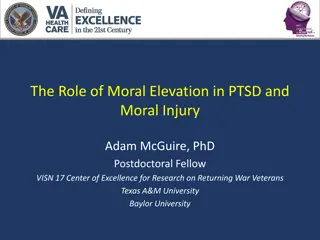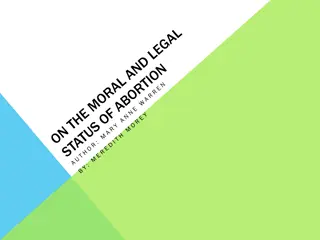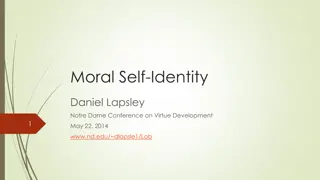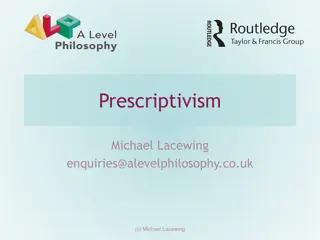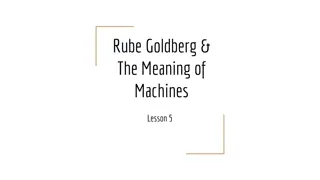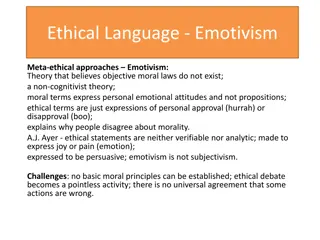The Supreme Gift-Giver vs. The Ingenious Self: Exploring Moral Principles in Creation.
Explore the concept of God as the Supreme Giver in Genesis, delving into the moral principles underlying creation and the comparative systems of morality presented. Discover how the models of Nature, Family, and Sabbath intersect with ancient Mesopotamian paradigms of Economy, Kingship, and Legal Relationships, reflecting on the principles of cause and effect, interdependency, family dynamics, and the importance of rest and reflection in human life.
Download Presentation

Please find below an Image/Link to download the presentation.
The content on the website is provided AS IS for your information and personal use only. It may not be sold, licensed, or shared on other websites without obtaining consent from the author.If you encounter any issues during the download, it is possible that the publisher has removed the file from their server.
You are allowed to download the files provided on this website for personal or commercial use, subject to the condition that they are used lawfully. All files are the property of their respective owners.
The content on the website is provided AS IS for your information and personal use only. It may not be sold, licensed, or shared on other websites without obtaining consent from the author.
E N D
Presentation Transcript
THE SUPREME GIFT-GIVER VERSUS THE INGENIOUS, SELF-MAKING HUMAN Jean Sheldon, Ph.D.
THE SUPREME GIVER One way of looking at God and His design for life in Genesis 1 and 2 is to understand an key moral principle that undergirds the creation of this world. In creation God operates as the Supreme Giver: giving a viable natural environment giving other creatures life giving the first humans life giving humanity the Imago Dei ability to create beings in their image through intimacy with each other. God gives the humans a garden with lots of food to eat, and then gives them an option for moral choice. If there was only one tree representing allegiance in the garden, no way would exist for them to decide whether or not they wanted to remain with God.
COMPARATIVE SYSTEMS OF MORALITY God also gave more gifts and these included paradigms for life. Embedded in the two creation stories of Genesis 1 and 2 are three models for how to live, do good, and how to treat one another: Nature, Family, and Sabbath Embedded in ancient Mesopotamian civilization as it came into being were also three models for how to live and enjoy life: Economy, Kingship, and Contractual legal relationships Below, I will list these with some of their elements
CREATION 1 NATURAL DESIGN Principle of cause and effect Interconnection and interdependency Human beings created to resemble God with ability to reason both intellectually and emotionally Ability to think and behave as responsible moral human beings
CREATION 2 FAMILY MODEL Marriage relationship: love, mutual trust, deepest intimacy, integrity, harmony, community developed with one s spouse Parent-child relationships: nurturing, development, forgiveness, selflessness, graciousness, modeling, imaging, transformation over time Sibling relationship: peer relations, egalitarian cooperation, social synchronization, camaraderie, symbiotic relationship between personal and group identity, interdependency
CREATION 3 SABBATH Freedom, Equality, No hierarchy, Time for relationships, reflection, perception Rest, rejuvenation, Friendship with God (no slaves) Ultimate meaning for life and personal value based on coming into fuller relationships and knowledge of God Rest from attempts to change God s thinking, rather trusting in His unfailing love Remembering God s commitment to be with humanity
MESOPOTAMIAN CIVILIZATION What humans created in terms of technology might better be called inventions rather than creations. Some early human beings attempted to make farming easier by inventing tools and other implements. Others became artisans, making housewares, and other crafts for domestic use. As inventions encouraged city life, nature and the family had less appeal than jobs in the city. This led to a weakening of the family. Gift-giving became obligatory, then gave way to exchange (expectations of return), finally buying and selling. The resultant economy became increasingly materialistic as opposed to natural.
HUMAN INVENTIONS 1 MATERIAL ECONOMY In a materialistic economy no value remains static for long. Economically-driven societies function primarily in arbitrary ways, applying both definitions to the word arbitrary (without reason and without cause), which changes human perceptions of reality and value. Substitution, competition, and inflation result, followed by hierarchical classism, slavery and objectification of persons.
HUMAN INVENTIONS 2 KINGSHIP One person rules over all the others. Whoever acquires the most power gains control and is viewed as having the most value Stratification of human value develops. People operate from an external locus of control as opposed to an internal locus. Rights are given to punish and control subjects. Angry kings must be appeased, leading to pretense, false posturing, and fake relationships.
HUMAN INVENTIONS 3 CONTRACT AND LAW In contractual and legal society, control is established through legally binding contracts. Compliance is enforced through fear of imposed penalties. Laws are implemented to serve as means of control. Punishments are enforced as the primary means of maintaining order. Legal compliance becomes the basis of human trust rather than inherent trustworthiness. Love and trust are demanded, not earned. The legal system gives people control to protect self-interests. It empowers social system that focuses on power, judging and condemning others. It diminishes ability to receive love freely given while fostering self- righteousness.
MORAL CONSEQUENCES Legality led to a breakdown of the basis of human moral causing power to be valued more than love. Fear replaced transparency and trust; contracts and laws displaced love for others as the primary motive in society. Just as technology affects how people relate to one another, sometimes in distressing ways, so the invention of transactional relationships altered the way individuals, friends, workers and bosses related to one another and functioned in everyday interactions.
CONTRASTIVE MORAL SYSTEMS The following comparative list contrasts the design of love with the ways of human invention and their respective applications to relationships. This list raises the question, are we chiefly living to serve ourselves, or will we reflect the Supreme Gift-Giver?
MORAL SYSTEMS 1 God s natural design: Human beings are valuable simply because God created them and ever seeks, at great personal cost, to win their trust while leaving them free to choose. Human invention: Human being s value is assessed by what they have accomplished, earned, how much power they have gained over others, or their score on the relative scale of good and evil.
MORAL SYSTEMS 2 God s natural design: Due to their value by right of creation, human beings are to be unconditionally loved, respected, and treated fairly and kindly. Human invention: Because recognition of value is deserved or compelled, human beings must earn respect, earn love, or deserve fair treatment.
MORAL SYSTEMS 3 God s natural design: at the heart of God s way, his commands are descriptive and they act creatively to empower those who willingly embrace His commands. Human invention: Human commands demand obedience on threat of imposed retribution against those unwilling to comply.
MORAL SYSTEMS 4 God s natural design: Divine commands are never arbitrary but simply describe how life is designed to be. Human invention: Human commands can be arbitrary and are artificial and often transitory, based on the whims of law-makers in power.
MORAL SYSTEMS 5 God s natural design: Everything is designed to fit naturally and function seamlessly with variations of roles. Human invention: People and things are often forced to fit and function according to whoever or whatever wields the greatest control over them, through fear or enticements of reward.
MORAL SYSTEMS 6 God s natural design:The basis of morality is eternal, internal, relying on the dynamic principles of love, truth, freedom of choice and trust absent any fear. Human invention: The basis of morality is conformity to externally enforced rules. This is inherently arbitrary as such rules are artificial and require external enforcement.
MORAL SYSTEM 7 God s natural design: Because the basis of morality involves integrated love, truth, freedom and trust, relationships are authentic, real and thriving. Human invention: Because the system is arbitrary, it is artificial, external, and contrived, and where hypocrisy flourishes.
MORAL SYSTEM 8 God s natural design: Because God loves everyone he has created both good and bad justice is fair, equitable, loving, always working for the highest good for each person. Consequences for evil are inherently natural, inevitable and caused by decisions of those who violate the natural, self- enforcing principles of reality. Human invention: Because the system is artificial and arbitrary, it must be backed by external enforcement (as opposed to empowerment). Justice is retributive, meting out enforced penalties assessed on a relative scale of good and evil to calculate what each offense deserves.
CONCLUSION God is love, and he ever seeks to love all his creation. To the extent that we give preference to God s natural design, we may experience natural benefits of living in harmony with his principles. These developmental principles involve natural stages of growth, reaping and sowing, resting and working, cause and effect. As we apply these principles in our lives, we increase our capacity to appreciate the God who is love and who does not rely on force, violence or controlled submission to bring either nature or us into line with his will.
